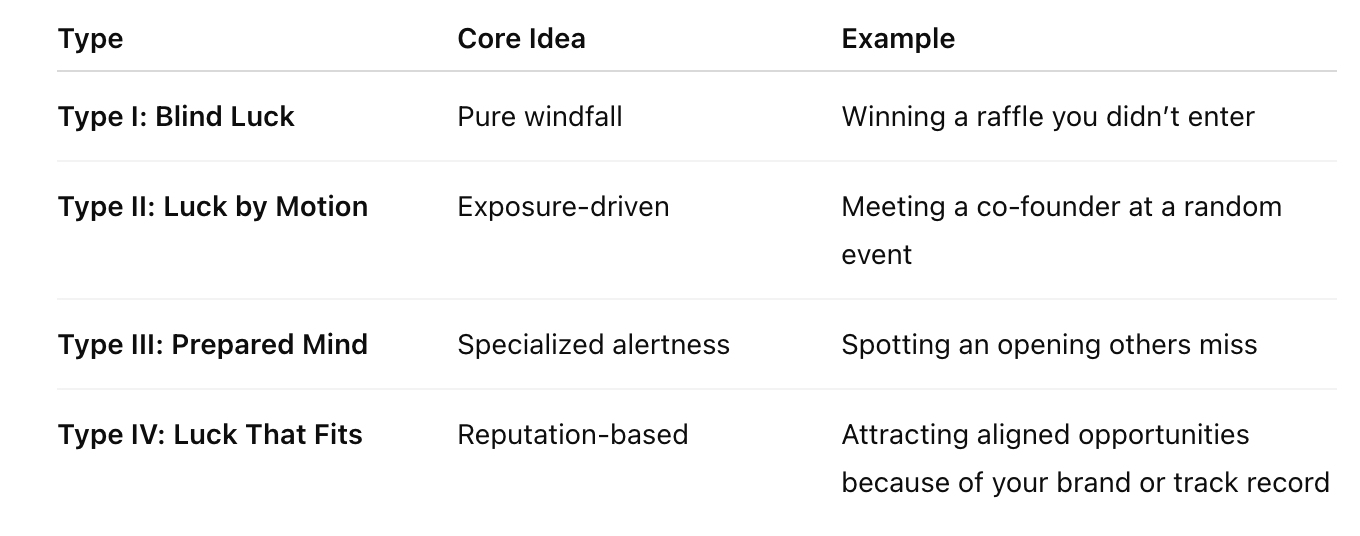P9: Luck - Luck Is Not a Lightning Strike
Those who have succeeded at anything and don't mention luck are kidding themselves — Larry King
- The Problem: Most of us are taught to think success follows a simple formula: put in hard work, get predictable results. But this belief often blinds us to the enormous impact of randomness in our lives and leaves us vulnerable when uncertainty hits.
- The Shift: What if luck wasn’t just chance, but a skill you could develop? By cultivating what I’ll call "Luck Intelligence," you learn to recognize randomness as a constant, build systems that harness its power, and increase your potential for serendipity through movement, preparation, and flexibility.
- The Payoff: When you work with luck instead of fighting it, you create opportunities you could never predict. You recover from setbacks more effectively, and your efforts compound over time. Success becomes less about precise forecasting and more about positioning yourself intelligently to thrive in an unpredictable world.
Umbrellas & Opportunity
A light rain falls over two coffee carts at a bustling London market.
At Cart A, the owner sees the drizzle, packs up, and leaves, assuming customers will disappear.
Over at Cart B, the owner grabs a bright yellow umbrella, keeps brewing, and waits it out.
By midday, the rain stops. Office workers spill into the streets, spot the only cart still open, and line up twenty-deep.
Same rain. Same market. Same starting point.
One saw the rain as the end. The other stayed visible long enough to catch the rush.
Here’s the thing about luck. It’s always falling. The real question is whether your umbrella is positioned to catch it.
We like to frame success as a straight line: work hard, have a plan, control the outcome. But life doesn’t actually behave this way.
The Blindspot That Holds Us Back
One of the biggest blind spots is believing success or failure is solely determined by talent, hard work, or merit. What we often overlook are the roles of luck, timing, and other external forces quietly shaping our outcomes.
When we fail to see the influence of luck, here’s what happens:
- We overcredit success to personal brilliance while underplaying the fortuitous breaks that made it possible.
- We treat failure as evidence of incompetence instead of recognizing it as a natural by-product of chance.
- We build rigid strategies around predictable patterns, ignoring the unpredictability of reality.
- We misread others' success stories, comparing our own progress to results they may not have fully controlled.
The danger of erasing luck from the equation? We replace truth with myth, which blinds us to future risks, inflates our ego after success, sours us on failure, and slows down our ability to adapt when the tide changes.
Why We Deny the Role of Luck
Culturally, we love the idea that discipline, grit, and preparation are the sole drivers of success. Believing this feels safe. It offers control. But it also hides an inconvenient truth:
Luck plays a far bigger role in success than we’d like to admit.
We’ve developed an allergy to luck, dismissing it as a fluke or anomaly, something that doesn’t belong in conversations about achievement. The result?
- We miss out on opportunities hiding in plain sight.
- We design careers, strategies, and lives resistant to surprise, even though the most significant breakthroughs often come from the unexpected.
Luck isn’t a short interruption of order; it’s the constant, unseen backdrop of life.
It’s present in every win, every loss, every pivot point. The question isn’t whether luck exists. It does. The real question is whether we can recognize it, adapt to it, and make it work in our favor.
Why It’s Hard to See Luck
Most of us like to believe we’re good at recognizing effort, skill, and perseverance. But the way we think about outcomes is riddled with biases, shaped by biology, culture, and psychology.
These biases create a blind spot around luck by:
- Driving our obsession with certainty and control.
- Making us resist the idea that chance plays a role in outcomes.
- Encouraging us to create simple, cause-and-effect explanations for things that often result from unexpected opportunities.
To develop what I like to call "luck intelligence," we need to understand why these biases exist and how they prevent us from seeing the full picture.
Acknowledge the Blindspot
Recognizing luck’s role doesn’t make you a cynic. It sharpens your perception.
By questioning the neat narratives we often create around success and failure, you can:
- Spot opportunities disguised as coincidences.
- Make decisions grounded in reality instead of illusion.
- Stay adaptive and nimble in an unpredictable world.
Acknowledging luck’s influence isn’t a weakness. It’s a strategic strength. By fully seeing luck’s role, you upgrade your ability to manage uncertainty and create better results in a rapidly changing environment.
Why This Matters Now
Luck is no longer a bonus skill. It’s an essential one.
The world has shifted. Stability is no longer the norm, and volatility has become a part of everyday life. Generative AI is redefining entire industries. Global events shake markets. Climate disruptions can alter economies in an instant. The rate of change isn’t slowing down.
There was a time when skill was the main driver of success. Career paths were steady. Market trends followed predictable cycles. “Best practices” were valid for years, even decades. Back then, luck played a role, but you could ignore it and still thrive.
Not anymore!
Welcome to the New Landscape
Systems Are Changing Faster Than You Can Master Them
Industries rise and fall within a few years, rendering mastery cycles too slow. Timing and exposure now hold as much weight as expertise.
A photojournalist might perfect their craft, only to see AI-generated content disrupt their field overnight.
Networks Amplify Chance
One well-timed introduction or viral moment can completely alter your path.
Think of a startup that lands a game-changing opportunity because someone made an unexpected introduction during a casual dinner conversation.
"Black Swan" Events Aren’t Rare Anymore
Global shocks and rapid breakthroughs have become routine, flipping entire markets upside down.
For example, the restaurants that adapted with flexible takeout services during COVID thrived, while equally skilled competitors couldn’t keep up.
Competition Is Borderless
The world is your competition. A designer in Lagos or Manila is now in direct contention with one in London, and a single strategic tweet can tilt the scales.
Why Linear Thinking No Longer Works
We were all raised to believe in this equation for success:
Work hard → Focus → Consistently rise toward your goals.
This model assumes a stable environment where input equals output. But today, outcomes are heavily influenced by randomness, disruptions, and serendipity.
Clinging to rigid, linear plans could leave you unprepared for the unexpected opportunities or challenges that come your way.
How Luck Awareness Changes the Game
Seeing luck as randomness meeting readiness shifts your approach. It’s not about blaming luck but working with it. When you understand luck’s role, you can:
- Move away from strict plans and pivot when surprises come your way.
- Break free from self-blame for outcomes shaped by factors beyond your control.
- Focus on smarter, flexible effort instead of grinding against uncertainty.
Luck isn’t something to beat. It’s something to leverage.
Building Systems That Thrive on Luck
Effort without thought can only get you so far. Instead, create systems that invite luck and capitalize on it. Here’s how:
1. Design for Serendipity
Run experiments, create opportunities to connect with others, and leave room for unexpected but meaningful interactions.
2. Take Smarter Risks
Seek out opportunities where the potential upside is far greater than the possible downside. These asymmetrical bets can pay off big.
3. Build Resilience & Antifragility Into Your Plans
Include buffers and flexibility in your systems so you’re not thrown off course by unexpected setbacks.
4. Learn How to Stay in the Game
Often, learning how to survive is your greatest advantage. Surivival beats persistence. The longer you survive, the more chances luck has to swing in your favor.
Resilience Belongs to the “Luck Intelligent”
Here’s the truth:
- Skill alone, without an understanding of luck, often leads to overconfidence.
- But luck-awareness, combined with skill and strategy, results in optionality, resilience, and staying power.
If you cling solely to predictability, your plans may crumble in the face of volatility. On the other hand, if you experiment, adapt, and build systems that work with luck, new opportunities will emerge.
You can either build castles in the sand, hoping the waves don’t come... or design structures that rise with the tides.
The power to adapt is yours. Choose wisely.
Why the Old Model Falls Short
Stop Treating Luck Like It Doesn’t Matter
The traditional industrial-age formula for success—work hard, specialize, and follow the rules—is rooted in the belief that skill and effort alone dictate results.
Back then, luck was seen as a rare bonus, not an everyday factor.
When a “Safety Net” Becomes a Trap
- Linear Plans Ignore the Role of Luck: Traditional planning assumes a stable cause-and-effect process, failing to account for the way small, random events can radically shift outcomes.
- Survivor Bias Overlooks Lucky Breaks: We tend to celebrate winners for their skills while ignoring the pivotal lucky moments that influenced their success.
- Fixed Strategies Struggle in Volatile Environments: Counting on a predictable future leaves you vulnerable when the unexpected strikes. A rigid approach often falters under the pressure of today’s unpredictable landscape.
The Industrial-Age Success Formula
During slower, more stable times, the following equation felt reliable:
Hard work → Predictable results → Steady progress
Careers advanced in an orderly way.
Markets moved in predictable cycles.
Best practices held their value for years.
Luck played a role even then, but the slower pace allowed you to act as if it didn’t.
Why It Fails in Today’s Rapid, Nonlinear World
That old playbook falls short in the fast-moving, chaotic systems we now face, where luck increasingly shapes outcomes.
Here’s why the traditional approach no longer works:
- Volatility is the New Normal: Luck isn’t just an occasional twist of fate anymore. It shows up daily, influencing outcomes in ways we can’t always anticipate.
- Skill Isn’t Always Portable: Industries evolve so quickly that by the time you master one skill set, it might already be obsolete.
- Adaptability Beats Persistence: Blindly staying on one path won’t cut it. The ability to pivot and adapt quickly often outweighs simply working hard in today’s environment.
- Feedback is Harder to Interpret: Without factoring in luck, you might mistake a bad decision as a misstep you need to double down on, or overestimate your abilities due to momentary good fortune.
The Bottom Line:
The old model thrived on predictable inputs and proportional rewards. But today, we’re dealing with uncertainty, luck-driven outcomes, and constant resets. If you stick to outdated strategies, you’ll find yourself unprepared when luck turns against you. At the same time, you’ll miss out on opportunities to capitalize when it favors you.
How Modern Culture Erased Luck
For most of human history, luck wasn’t an afterthought. It was how we explained what we couldn’t control. But somewhere along the way—from the rise of industrial efficiency to the age of degrees and credentials—we quietly pushed luck out of the narrative.
We built systems that celebrated effort and skill, convincing ourselves these were the only ingredients to success. The belief that hard work always equates to outcomes became the norm. Meanwhile, randomness and chance were dismissed as myths of a superstitious age.
But luck never left. Ignoring it hasn’t made life more predictable; it’s only made us more vulnerable.
Here’s where it trips us up:
- We misread success. When luck stays invisible, we over-credit skill while overlooking timing, access, and chance.
- We misunderstand failure. Setbacks become personal flaws rather than the natural chaos of how the world works.
- We stick too rigidly to outdated maps. By believing in pure meritocracy, we miss opportunities outside the neat narrative we’ve built.
Luck still shapes results, silently and significantly. Pretending otherwise leaves us ill-prepared for life's curveballs. The alternative? Acknowledge it. Build systems that account for randomness. Learn how to turn surprises into opportunities rather than losses.
A Short History of Luck
Ancient Luck – The Realm of the Gods
To the ancients, luck wasn’t an abstract concept. It had a personality. The Egyptians worshiped Shai. The Greeks prayed to Tyche. The Romans built entire temples to Fortuna. Fate was seen as a force to negotiate with, often through rituals, offerings, or prayer.
Stoic & Classical Views – Fate vs. Virtue
The Stoics gave luck a philosophical twist. Fortune was beyond anyone’s control, so why waste time worrying about it? Instead, they championed virtue and self-discipline as the only things you could truly own. Similarly, Greek tragedies reinforced this idea, portraying fate as cruel yet inevitable.
Medieval Luck – Providence and the Wheel
Enter medieval Europe and Christianity. "Luck" intertwined with theology, becoming a moral test. Life's highs and lows were interpreted as God’s plan, with events like misfortune reframed as spiritual lessons. The "Wheel of Fortune" became a symbol of life’s uncertainty, revolving under divine supervision.
Renaissance Luck – Opportunity Meets Boldness
The Renaissance ushered in a new perspective. For Machiavelli, Fortuna was like a wild river. You couldn’t stop it, but you could shape it with skill, courage, and decisiveness. Luck was no longer just endured; it could be wrestled with and, occasionally, conquered.
Enlightenment Luck – Numbers and Probability
The Enlightenment turned luck from the mystical to the measurable. Thinkers like Pascal and Bernoulli introduced probability and statistics to map out uncertainty. Concepts like gambling odds, insurance tables, and risk management brought logic and numbers into the luck equation.
Industrial Luck – The Meritocracy Illusion
By the industrial era, society leaned heavily into the belief that success was the inevitable result of hard work, education, and discipline. But while this meritocracy narrative was comforting, it ignored the pivotal role of timing, luck, and happenstance.
Modern Luck – Complexity and Chaos
Today, complexity science and global networks remind us how deeply intertwined timing, randomness, and connections are in shaping outcomes. Institutions are starting to reintroduce luck into serious discussions—but culturally, people remain hesitant to admit, "I got lucky." We still prefer success stories that center on effort and skill.
From History to Psychology
Luck isn’t just misunderstood culturally; it’s also misunderstood cognitively. Our brains are hardwired to prefer clear, linear stories, often overestimating the role of skill or effort while ignoring the impact of chance.
Over generations, societies have reframed luck in countless ways, but our minds still struggle to grasp the randomness of the world. If we want to harness luck effectively today, we first need to recognize and challenge how our perception of luck gets skewed.
Why Our Brains Resist Luck
The Uncomfortable Role of Chance
Picture this: You’re at an awards gala, clutching a trophy for a major industry achievement. A journalist asks, “What do you think led to your success?”
Most of us instinctively respond with something like, “Hard work and discipline.” Rarely do we say, “I was in the right place at the right time.”
Now flip the scenario. You’ve just lost a major client. Do you blame a competitor’s better pitch or the bad timing of your proposal landing right as their CFO slashed budgets? Again, most default to the first. Blaming luck feels like avoiding responsibility.
Our discomfort with luck goes deeper than simply disliking randomness. It’s personal. It challenges our identity, sense of control, and the narratives we create about our lives.
7 Reasons We Struggle to Accept Luck
1. Luck Threatens Our Self-Made Narrative
We love the idea that we’re the authors of our success stories, with skill and effort driving the plot. Admitting that luck played a role disrupts this narrative.
It’s especially uncomfortable in societies that celebrate individualism and self-reliance.
2. Luck Undermines Our Sense of Control
If luck plays a major role, it means results aren’t guaranteed, even when we do everything “right.”
This disrupts our brain’s preference for predictable cause-and-effect outcomes. We crave reliable formulas, but luck reminds us there’s no guaranteed path.
3. Luck Challenges the Belief in a Fair World
We’re wired to believe in fairness—that good things happen to good people and bad things to bad people. Luck disrupts this belief. Witnessing undeserving success or unfair misfortune forces us to confront the uncomfortable truth that the world isn’t always just.
4. Luck Feels Like a Threat to Status
Historically, projecting competence and control was essential for survival. Saying, “I got lucky,” might feel like admitting weakness or dependence. Ironically, acknowledging luck often demonstrates authenticity and humility, but our instincts tell us to protect our reputation.
5. Luck Is Emotional, Not Logical
While probabilities are purely mathematical, luck is deeply emotional. It’s the unexpected meeting that changes your career or the weather that ruins your carefully planned event. These emotionally charged moments make it harder to view luck as a neutral factor.
6. We Confuse Luck With Deservedness
Good fortune feels earned, and misfortune feels like punishment. This belief in a moral overlay makes it hard for us to view luck as just chance. Instead, we assign meaning, believing luck reveals something about our value or worth.
7. Luck Is Hard to Plan For
Unlike risk, which can be calculated and hedged, luck is unpredictable and messy. It’s a mix of timing, context, and randomness that defies simple frameworks. Our minds love clear, tidy inputs—but luck won’t fit neatly into a plan.
Seeing Luck Clearly Is a Strategic Advantage
Resisting luck isn’t just an emotional bias. It’s a practical blind spot.
When we downplay the role of luck, we overlook key variables, misinterpret outcomes, and overestimate how easily success can be repeated.
Yes, skill matters. Effort matters. But so do the tailwinds you didn’t create and the headwinds you couldn’t stop.
Acknowledging luck doesn’t diminish your achievements; it gives you a broader perspective. It helps you prepare for the twists of fortune and spot opportunities when they arise.
The most effective leaders and thinkers don’t resist luck—they recognize it, learn from it, and adapt. By doing so, they position themselves to thrive, even as the winds of chance shift.
What Luck Really Is
Most people misunderstand what luck actually means.
Some think of it as pure chaos, like lightning strikes or winning the lottery. Others dismiss it entirely, claiming that hard work is responsible for every success.
But neither perspective gets it quite right.
Luck isn’t magic, and it’s not irrelevant. It’s what happens when randomness meets preparation, awareness, and action.
Random events on their own are just noise. But when you’re ready, paying attention, and willing to take action, those unpredictable moments turn into real opportunities.
The Stoic philosopher Seneca put it best, “Luck is what happens when preparation meets opportunity.”
Two people might encounter the same random event – hearing a snippet of an interesting conversation, noticing a major industry trend, or being introduced to someone influential. One might shrug it off and move on, while the other seizes that moment to do something extraordinary. The difference isn’t the randomness itself; it’s how prepared and perceptive you are to turn it into something meaningful.
Niccolò Machiavelli compared luck, or “Fortuna,” to a wild river. Half of life is shaped by forces beyond our control. But with skill and courage, we have the power to guide the other half.
Luck, in simpler terms, is favorable randomness. It’s when chance aligns with your goals, and you’re ready to act.
Luck vs. Skill, Privilege, and Randomness
When we talk about success, it’s important to separate four key forces that often get lumped together.
- Skill is the expertise you practice and improve. It’s completely within your control.
- Privilege refers to the systemic advantages you inherit, like your upbringing or access to resources.
- Randomness encompasses all the unpredictable, neutral events that happen regardless of you.
- Luck is when randomness intersects with your preparation and aligns with your personal goals.
Each plays a role, but making these distinctions is critical. It prevents confusion between effort and circumstance or blaming failure on misfortune alone. More importantly, recognizing the role of luck helps you approach it strategically.
To build skill, you focus on learning and practice. To work with luck, you cultivate awareness, readiness, and an ability to act on opportunities.
Not All Success Is Created Equal: Skill vs. Luck Dominance
At first glance, success can appear the same. Whether it’s a million-dollar business exit, a bestselling product, or a thriving dental practice, the results all look impressive. But the forces driving these outcomes can be worlds apart.
Here’s the breakdown:
Domain Type | Variance | Example |
|---|---|---|
Skill-Dominant | Low | A dentist steadily earns $1M over years through expertise and consistent effort. |
Luck-Dominant | High | A musician earns $1M (or nothing) depending on one viral hit. |
This difference isn’t trivial. It significantly impacts how you approach planning, investing, and managing risk.
Skill-dominant fields reward consistency, mastery, and intentional improvement. Put in the effort, and outcomes are generally predictable.
Luck-dominant fields, on the other hand, thrive on timing, exposure, and network effects. Results can wildly differ even among equally skilled individuals.
Example:
- Dr. Lee, the Dentist: Years of mastering their craft lead to opening a clinic and building a stable and predictable income.
- Sky, the Rockstar: After years of small gigs, one viral performance changes everything.
Both may end up with a similar financial outcome, but their paths couldn’t be more different. Dr. Lee’s success is repeatable and steady, while Sky’s story is a mix of volatility and one-off chances.
Why It Matters
Failing to understand which game you’re playing can lead to costly mistakes.
- Treating a luck-dominant field like a skill-dominant one might lead you to over-optimize, seeking control when what you really need is exposure.
- Treating a skill-dominant field like a luck-dominant one could encourage risky behavior when consistency and deliberate improvement are the keys to success.
When you identify the type of game you’re in, you’ll make smarter choices. Whether it’s doubling down on skill-building or leveraging exposure opportunities, aligning your strategy with your game type could make all the difference.
Why Mediocre (but Lucky) Out-Earns Brilliant (but Unlucky)
Data and simulations tell the same story: in many competitive arenas, the top earners aren’t the most talented — they’re the ones who hit a lucky break early and then rode its momentum.
Small, early advantages snowball into outsized rewards over time. Meanwhile, brilliant but unlucky players may stall or disappear from view, even if their skill is greater.
Here are some real-world examples:
- Scientific publishing: A handful of papers get most citations.
- Startups: Just a few dominate market valuations.
- Creative fields: A tiny fraction of works become blockbusters; the rest are barely noticed.
The pattern follows a power-law distribution: most efforts remain invisible, while a few — often propelled by lucky timing, not superior quality — capture the majority of rewards.
The uncomfortable truth: Talent matters, but in many high-variance environments, luck matters more. If you don’t account for it in your strategy, you’ll misread both your wins and your losses — and be unprepared for either.
When most people think of luck, it feels like something rare and external. A lightning strike. A roll of the dice. Something entirely out of your control. But that’s not how luck actually works.
Luck isn’t a singular force. It’s a field–always present, almost invisible, and constantly swirling around you. You’re moving through this field every day, whether you realize it or not.
Your positioning, actions, and openness determine how much luck finds you—and how much you miss.
The Four Types of Luck
Not all luck works the same way. Dr. James Austin’s framework breaks it down into four actionable types:

You can’t control Type I luck. But Types II through IV are completely within your influence.
By moving more, staying alert, and building a strong reputation, you can actively increase your chances of favorable randomness.
For instance, meeting a co-founder at a casual event (Type II) or recognizing a unique opportunity in your field (Type III) are actions driven by motion and attentiveness.
Similarly, cultivating expertise over time means opportunities will start finding you (Type IV).
Naval Ravikant offers this timeless advice for success: “Play long-term games with long-term people.” This strategy not only compounds results, but it also expands your “luck surface area,” ensuring randomness continues to work in your favor over time.
Final Thoughts
Luck isn’t just something to rely on or hope for. It’s something you can cultivate through preparation, attentiveness, and aligned action.
By understanding the factors that contribute to luck and taking steps to amplify them, you can transform random events into opportunities that redefine your path.
To truly harness the power of luck, you don’t need to leave it to chance. Double-down on preparation, surround yourself with the right people, and keep your mind open to possibilities. When you do, randomness becomes the secret ingredient to meaningful success.
The Reality You Can't Ignore
Luck isn’t some rare twist of fate. It’s a constant, compounding force that shapes every outcome in ways we don’t always see. And in today’s fast-changing, unpredictable world, luck’s influence is bigger than ever.
There was a time when you could overlook luck. Systems changed slowly, dedication led predictably to results, and phrases like "hard work pays off" genuinely rang true. But now? The rules have shifted.
The factors you can’t control—timing, connections, market disruptions, algorithm tweaks, global events—are far more powerful than the ones you can:
- Pace of change magnifies timing: Being just a few months early or late can mean the difference between breakout success and complete irrelevance.
- Networks scale chance: One unexpected introduction can either open, or close, doors you didn’t even know existed.
- Shocks arrive faster and hit harder: From technological disruptions to geopolitical upheavals, one event can rewrite the rules overnight.
- Winner-take-most dynamics magnify luck: Minor wins can snowball into massive advantages, while small misfortunes can completely derail progress.
Ignoring the role of luck isn’t just outdated thinking anymore—it’s risky. If you fail to account for luck, watch out for these traps:
- You’ll overestimate your own control.
- You’ll underprepare for setbacks when they happen.
- You’ll miss opportunities to cultivate positive luck while guarding against the negative.
Luck awareness isn't just a nice-to-have. It's an essential survival skill.
You may not be able to cdecide when or how luck shows up, but you can structure your efforts, connections, and strategy so that when luck turns your way, you’re ready to capitalize on it.
And when it doesn’t, you’re positioned to weather the storm.
Luck Is a Field, Not a Force
Luck isn’t some magical energy that chooses people at random. It’s more like a field you move through, with strong currents in some areas and weak ones in others. You can’t control those currents, but you can choose where to stand and how to position yourself so they work for you rather than against you.
The Wise Farmer’s Perspective
You've probably read the old parable about a Chinese farmer.
An old Chinese farmer used a single horse to plough the fields. One day, the farmer's horse escapes, and the neighbors call it “bad luck.”
A week later, the horse returns with a herd of wild horses, and everyone calls it “good luck.”
One day, while the farmer's only son was riding one of the wild horses to tame it, he broke his leg. Everyone thought this was “bad luck.”
Then the army passed by the village looking for strong young men. After looking at the son's injury, they spared him. Again, everyone thought this was “good luck.”
Each time something happened, the farmer calmly replied, “Good luck, bad luck, who knows?”
Most people interpret this as a lesson in passive acceptance. But it's more than that.
It's flexibility and humility.
Outcomes take time to reveal themselves, and luck has a way of changing form. The best strategy is to remain both emotionally flexible and strategically prepared, allowing you to adjust as circumstances evolve.
Why We Need Serendipity More Than Ever
The modern world runs on speed, surprise, and extremes. It rewards people who are open to unexpected opportunities and can pivot quickly. Whether it’s a random introduction, an unplanned detour, or an experiment that didn’t work out, the biggest breakthroughs often come from what you least expect.
But serendipity isn’t purely random. It’s a skill. The more you stay open, experiment often, and build connections, the more frequently you’ll bump into opportunities that you couldn’t have planned for. Those who understand this are able to turn what looks like accidents into their biggest successes.
The Truth No One Talks About
We saw earlier that not all success is created equal.
Some wins are built on skill and discipline, while others are largely the result of luck.
Here’s the uncomfortable truth most people overlook: luck plays a much bigger role in success than we care to admit—but it’s more manageable than we realize.
We live in a world shaped by randomness. Serendipity. Chance meetings. The unexpected paths that lead us to breakthrough opportunities. These moments may look like distractions, but they’re actually powerful opportunity generators—as long as you’re paying attention and open to recognizing them.
Of course, skill and hard work matter. But in an unpredictable world, openness, curiosity, and adaptability are just as critical (sometimes even more so).
In The Drunkard’s Walk, Leonard Mlodinow demonstrates how randomness influences outcomes. Talented people can fail, while underestimated individuals can stumble into unbelievable success.
Here’s the hidden truth about luck most people never hear:
Luck isn’t entirely random, nor is it something that simply happens to you. It’s something you can design your life to capture more of. And when luck inevitably turns against you? Smart planning can help you bounce back.
4 Hidden Rules About Luck
1. Exposure matters just as much as effort
You can be incredibly skilled, but if you’re in the wrong room or unnoticed environment, your effort may go unnoticed. Putting yourself in the right places matters as much as the work itself.
2. Small breaks compound
A single lucky break can snowball into enormous success. The key is to be ready to maximize each opportunity when it comes your way.
3. Bad luck is unavoidable
No one escapes misfortunes. Without preparation or buffers, just one stroke of bad luck can undo years of effort.
4. You can tilt the odds
By increasing your “surface area” for opportunity, you multiply the chances for luck to find you. Be present, connect, and stay curious.
Luck isn’t entirely random, nor is it something that simply happens to you. It’s something you can design your life to capture more of.
The Biggest Risk of All - Ignoring the Role of Luck
Most people treat luck as a background detail, an uncontrollable force that they casually ignore. They focus solely on what they can control and just hope everything else works itself out. But here’s the catch: ignoring luck isn’t harmless. It leads you to misinterpret your successes, downplay your risks, and overlook countless opportunities to shift the odds in your favor.
If you want to thrive in a world full of uncertainty, the solution isn’t just working harder. The real key is learning how to work smarter and luckier. It starts with understanding the hidden risks of pretending luck doesn’t matter and how you can align your actions to capitalize on it.
The Hidden Costs of Ignoring Luck
Most people don’t realize just how much luck shapes outcomes.
Overlooking it isn’t just a philosophical blind spot. It’s a practical mistake that can sabotage your decisions and results. Ignoring the role of randomness often leads to doubling down on losing strategies, delaying necessary changes, and missing out on unexpected opportunities.
We love to celebrate grit and discipline, but taken too far, they can lead to rigidity instead of growth. The ability to notice unpredictable shifts and adapt quickly often creates a clear line between those who succeed and those who stagnate.
When we ignore luck, we distort how we see ourselves and others.
This blindness warps systems, undermines innovation, and damages resilience. Ultimately, it's not just misguided thinking; it leaves us poorly equipped to handle an unpredictable world.
The Personal Costs of Luck Blindness
Over-Personalizing Success and Failure
Believing that every outcome is fully self-made can lead to toxic perfectionism. Wins become a badge of brilliance, while setbacks feel like proof of personal failure. There’s no room for randomness in this view, and the result is fragile confidence.
Burnout and Rigidity
When you think you need to control every variable, life can quickly become overwhelming. Overwork becomes the norm, and sticking to rigid plans feels like the only way forward. But in a chaotic world, trying to control everything isn’t just exhausting; it’s unsustainable.
Lack of Humility and Empathy
When luck is ignored, success is often attributed to moral superiority, and failure is pinned on personal flaws. Even in controlled experiments, winners tend to over-credit their own skills rather than external circumstances. The result? Less compassion for yourself and others.
The Social and Structural Costs
The Myth of Meritocracy
When success is always seen as “earned,” those who are unlucky suffer twice.
First, they face their circumstances, and then they’re blamed for them. This mindset leads to less support for safety nets and wider inequality. It erodes the social fabric.
Reactive Systems That Can’t Handle Shocks
Leaders who are blind to randomness build fragile systems that buckle under pressure.
Whether it was the 2008 financial crisis or pandemic-related supply chain disruptions, systems that dismiss rare but real shocks are always exposed when tested.
Missed Opportunities and Stifled Creativity
Organizations and cultures that overlook the role of luck often over-optimize for predictability.
This kills experimentation and eliminates the potential for serendipity, stifling breakthroughs and strangling innovation.
The Cultural and Emotional Toll
Harder Cultures, Harsher Judgments
Neglecting luck creates societies where poverty is seen as deserved and failure as incompetence. This mindset weakens collective safety nets, leaving communities brittle during crises.
Lost Meaning and Gratitude
By ignoring the role of chance, we lose the ability to feel awe and connection. But acknowledging luck doesn’t diminish success; it enriches it. It fosters gratitude, humility, and a spirit of generosity.
The Shift To Luck Intelligence
Denial of luck isn’t a sign of realism or strength. It’s a strategic weakness. The most resilient individuals and systems see luck for what it is and design with it in mind.
Luck isn’t a lightning strike! It’s a constant force that surrounds us. Even though you're not able to control it, you can read the currents, place yourself in the their midst, and adapt when they shift.
Remember that true success is never just about hard work and strategy. It's also about humility, adaptability, and understanding that chance plays a huge part.
But before we explore how to build luck intelligence, you should also try to avoid some of the commen myths about luck.
What Luck Is NOT
When people hear the word "luck," they often think of something mystical, unfair, or completely out of their control—but that’s not the full story.
Through the Agilism perspective, luck isn’t magic or fate. It’s what happens when exposure, readiness, and smart systems combine with randomness.
It’s important to draw some boundaries here. Luck thinking doesn’t reject talent, effort, or perseverance. Nor is it some excuse for passivity, fatalism, or coasting along. Instead, it recognizes that effort and environment interact, and randomness plays a quiet yet immense role in life.
Common Misconceptions About Luck
To clear up any misconceptions, here’s what luck is not:
❌ It’s NOT Mysticism or Blind Chance
Luck isn’t purely random fortune or dumb luck.
It’s about actively increasing your "collision surface" with opportunity. The broader your surface area, the less superstition matters.
❌ It’s NOT Wishful Thinking
Luck isn’t wishful thinking, manifestation, or the "law of attraction."
Positive vibes alone won’t sway randomness in your favor. Real luck flows from movement, experimentation, and staying open to possibilities.
❌ It’s NOT a Substitute for Hard Work
Hard work, preparation, and persistence are still the foundation.
Luck amplifies the results of your effort, but it doesn’t replace the need for it. Without competency, even a "lucky break" fizzles out.
❌ It’s NOT an Excuse to Drift
Understanding luck isn’t permission to coast.
Exposure is created through action. Those who stay curious, build, connect, and explore increase their chances of catching unexpected opportunities.
❌ It’s NOT a Denial of Privilege
Luck doesn’t erase unfair starting points.
Advantages like birthplace, access to networks, or timing can profoundly shape outcomes. Acknowledging luck sharpens the view on merit, emphasizing both effort and unequal external factors.
❌ It’s NOT Validation or a Reward From the Cosmos
Luck isn’t a moral scoreboard.
Success isn’t always "deserved," and randomness often picks winners. Sometimes the right actions win out—but sometimes, sheer chance takes the reins.
The Real Mindset Shift
Your Luck Surface Area is the rent you pay for opportunity.
The moment you stop viewing luck as lightning and start seeing it as rain, your entire strategy shifts.
You stop obsessing over controlling every drop that falls.
Instead, you focus on maximizing your surface area with luck – creating more points of collision between readiness and randomness.
You'll stay emotionally flexible, so you’re ready to act when unpredictability drops an opportunity right in front of you.
Luck Intelligence
Luck Intelligence = Understanding randomness + putting yourself in a position to benefit from it.
Stop thinking you can eliminate uncertainty. You can't. Likewise, stop trying to control every wave that comes your way.
But you can build habits, systems, and decision-making frameworks that position you for success when randomness strikes. Whether it’s a windfall or a setback, you’re not just a passive observer. You’re prepared to act.
Luck Intelligence isn’t about wishful thinking or blind optimism.
It’s about strategic positioning. It’s intentionally placing yourself in environments where good opportunities are more likely to come your way. And when they do, having the skills, credibility, and flexibility to capitalize on them.
What Luck Intelligence Looks Like
✅ It IS Expanding Your Surface Area
Good things happen when you increase your odds of collisions—with new people, ideas, or environments.
Luck favors those who intentionally widen their exposure. The goal isn’t to "wait and see" but to actively invite opportunity into your world.
✅ It IS Being Prepared For Opportunity
Opportunities don’t count for much if you’re not ready to act on them.
Skills, credibility, and mental flexibility are your tools for turning the unexpected into tangible results.
Preparation makes randomness actionable.
✅ It IS Navigating with Adaptability
Luck rewards those who intelligently respond to the unexpected.
Remember, rigid plans shatter under volatility. Flexible systems bend, absorb shocks, and pivot when opportunities appear.
It’s not a straight road; it’s an ongoing process of iteration and pivots.
By staying flexible and paying attention to subtle signals, you uncover small, compounding advantages others overlook.
✅ It IS About Thriving in an Ecosystem
Luck thrives in ecosystems—not in isolation.
The more you share ideas, collaborate, and help others, the more you join the natural flow of serendipity. Being engaged and generous builds goodwill that cycles back in unexpected ways.
✅ It IS Small Calculated Bets With Big Upside & Limited Downside
Instead of banking everything on one big swing, the luck-savvy person spreads bets across small, low-risk moves.
Each one carries the potential for an outsized reward. A diversified approach increases the odds of life-changing results while managing failure.
✅ It IS Playing a Long Game – And Staying in the Game
Luck doesn’t follow a linear timeline. A connection you make today might jog someone’s memory years down the line.
Engaging consistently and visibly keeps your opportunities compounding in ways that aren’t immediately obvious.
The longer you can keep playing — financially, emotionally, strategically — the more likely you are to encounter luck. Resilience is a luck-multiplier.
The Takeaway:
Surface area scales faster than certainty.
More collisions → more luck → less need for perfect prediction.
Luck isn’t magic. It’s a deliberate, adaptive game.
Keep your surface area wide, your bets smart, and your mindset flexible. That’s how you turn randomness into results.
Final Thoughts: Stay in the Game
Luck isn’t a glitch in the system. It’s built into the framework. Ignore it, and you’ll wander aimlessly. Fear it, and you’ll freeze.
But work with it, and you can harness it as one of your greatest tools.
The playbook is straightforward:
- Cut the drag. Reduce the noise and friction that sap your energy and slow your progress.
- Build margin. Keep space open to explore unexpected opportunities. Flexibility creates room for growth.
- Make small bets. Seek high returns with minimal risk. Test, learn, and iterate.
- Stay visible. Build credibility, stay connected, and remain active in your ecosystem.
- Think networks, not isolation. Opportunities emerge in relationships, not from working in silos.
- Adapt quickly. Rigid plans crumble under change. Stay ready to pivot, adjust, and move with agility.
The goal isn’t to sit around waiting for "good luck." It’s about staying in the game long enough – and in the right places – for luck to find you.
Opportunities aren’t hidden behind one locked door.
They’re seeds scattered across the landscape, waiting to take root. Your role is to plant broadly, nurture consistently, and be prepared when it’s time to reap the rewards.
Success doesn’t come from being the best predictor of the future. It comes from positioning yourself to take action when the unexpected occurs.
Luck is everywhere.
The rain is already falling.
The field is alive with opportunities.
Don’t wait under cover, hoping for a perfect moment. Step out into the storm with intention. Hold your umbrella wide. Be ready to adjust, move, and dance in the rain.
It’s not about being “lucky” or “unlucky.” It’s about creating the conditions where randomness works in your favor.
Stay adaptable. Stay curious. Keep your surface area open to opportunity.
Because the longer you stay in the game, the more the game tilts in your favour.
Additional Resources:
FAQ About Luck
Which question below gets you thinking the most? Pick one. Reflect on it. Journal your thoughts.
Discomfort isn’t failure; it’s a compass.
It shows you where a sharper, more resilient version of yourself can grow. This is how you move from simply reacting to life to navigating it like a pro in the game of Randomia.
▶ If luck is real, does that mean hard work doesn’t matter?
A: Not at all. Hard work amplifies the effects of luck.
Luck might open the door, but preparation determines whether you can step through it. Think of hard work as the price of entry—not a guarantee, but a necessary investment.
▶ Isn’t it depressing to admit randomness plays a big role?
A: It’s liberating actually.
You don’t have to carry the weight of controlling everything. Instead, focus on building habits that turn randomness into an ally over time.
▶ What if I just wait for luck to find me?
A: Waiting isn’t a plan; it’s slow decay.
Luck notices motion. Try experiments, start conversations, create collisions. Exposure beats passive hope every time.
▶ If luck matters so much, why even bother planning?
A: Plans are just frameworks, and you shouldn't treat them as scripts.
They push you forward but need to flex as randomness introduces new variables. Plan like an architect but adapt like an artist on the street.
▶ Isn’t talking about luck just an excuse for people who didn’t work hard enough?
A: Not at all.
Acknowledging luck doesn’t dismiss effort; it refines it. It keeps you humble about your wins and hungry to optimize your position for what’s next.
▶ Can’t you just manifest good luck through positive thinking?
A: Optimism helps keep you moving, but action is what creates opportunities.
You can’t manifest a harvest if you never plant any seeds.
▶ How do you “increase your surface area for luck” without burning out?
A: Focus on intentional, smart actions instead of endless hustle.
Widen exposure efficiently with small, strategic steps like curiosity-led meetings, tiny experiments, or visible efforts (like prototypes). You don’t need thousands of attempts, just a handful of meaningful ones.
▶ What’s the biggest mistake people make about luck?
A: They wait for it instead of building systems that attract it.
Luck isn’t magic. It’s a framework you create through curiosity, visibility, and deliberate action.
Go Deeper
The following aren't just questions. They’re challenges to the subtle scripts you may be living by. Pick one, and sit with it longer than feels comfortable.
▶ Is your obsession with control preventing new opportunities?
Rigidity can feel responsible, but it’s often just fear in disguise.
Life is nonlinear. Clinging to certainty closes the door on the randomness you need to grow.
▶ Are you working hard, or are you hiding inside work to avoid uncertainty?
Sometimes people double down on tasks because the unknown feels unbearable.
But grinding harder doesn’t shield you from randomness. It can actually blind you to it.
▶ Are you building skills that attract luck, or just playing it safe?
Luck rewards those who widen their surface area.
If you’re sticking only to predictable, safe routes, you’re likely missing the collisions that could change everything.
▶ Are you preparing for the unexpected or just hoping it doesn’t come?
Most plans quietly assume stability.
What would happen if you designed systems that could thrive on surprise instead of merely surviving it?
▶ Are you playing games that demand perfection or ones that reward adaptability?
Perfection is fragile.
Optionality, agility, and diversity of effort are what make you antifragile. Which are you really optimizing for?
Toolkit: Harnessing Luck
Luck isn’t some rare twist of fate. It’s a continuous force that influences outcomes more than we often realize.
This toolkit gives you actionable principles, habits, and systems to partner with luck intentionally. Instead of treating randomness as chaos, you can transform it into a consistent advantage.
1. Recognize That Luck Is Always Around You
Think of luck less like a lightning strike and more like the weather.
It’s not rare or random, nor something you can schedule or control. Luck shows up constantly—as a breakthrough or even a setback—but it doesn’t wait for convenient timing or follow any rules of fairness.
Luck isn’t limited to life-altering moments. It often hides in the small, everyday experiences we overlook. The delayed train that leads to a meaningful conversation or the casual side project that ends up shaping your career—that’s luck in action.
The key is to change how you see it. Luck isn’t a rare, fleeting phenomenon; it’s everywhere, quietly working in the background, waiting to intersect with your goals when you’re prepared to notice and act on it.
2. Recognize How Luck Works Alongside Skill, Privilege, & Randomness
When we talk about success, we often mix together four key forces that shape outcomes. Understanding the differences between them can transform the way you approach opportunities and challenges.
| Term | Meaning |
|---|---|
| Skill | Repeatable expertise you control. |
| Privilege | Structural advantages you inherit. |
| Randomness | Unpredictable events, indifferent to you. |
| Luck | Randomness intersecting with your personal goals. |
By defining and differentiating these forces, you can avoid confusing hard work with accidents or attributing failures to personal shortcomings.
Recognizing how luck, skill, privilege, and randomness interact is a crucial step toward working with luck intentionally and making the most of your opportunities.
3. Expand Your Surface Area for Luck
While you can’t control randomness, you can increase the chances of it working in your favor by expanding your "luck surface area." Here’s how you do it:
- Connect More. Build relationships with diverse people, explore new ideas, and engage with unfamiliar environments.
- Stay Curious and Adaptable. Keep asking questions, learning, and staying flexible enough to pivot when needed.
- Keep Moving Forward. Luck favors those in motion. If you remain stagnant, you may never collide with opportunity.
- Experiment Often. Test small ideas to uncover new opportunities. Each experiment creates another entry point for success.
Key Insight: Quantity beats perfection. The more chances you create, the less dependent you are on certainty or perfect predictions.
4. Amplify Luck by Combining It With Other Forces
Luck doesn’t work on its own. It strengthens when paired with other factors:
- Preparation: Be ready to take action when opportunities appear.
- Timing: Move not just the right way, but at the right moment.
- Environment: Surround yourself with spaces where opportunities naturally arise.
- Resilience: Stick around long enough for luck to catch up.
- Leverage: Turn small wins into disproportionate rewards.
- Adaptability: Adjust your plan when circumstances shift.
- Intentionality: Act with purpose and focus rather than aimlessly drifting.
When these forces work together, you create the conditions needed for luck to strike.
5. Eliminate What’s Holding You Back
It’s often easier to spot what drains your energy than what boosts it. Use that insight to your advantage.
- Audit every part of your week and identify the bottom 5% of experiences.
- Remove or redesign those energy-draining items.
- Cancel unproductive meetings.
- Move your phone charger out of your bedroom.
- Swap a glass of late-night wine for a calming tea.
Each subtraction eliminates friction, elevates your baseline, and creates room for better opportunities to land.
6. Give Luck Room and Time to Happen
A packed schedule leaves no space for serendipity. Opportunities need room to grow.
- Set aside one empty afternoon each week.
- Leave time buffers between meetings to follow curiosity.
- Take mini-sabbaticals to recharge and explore new interests.
- Invite randomness into your life by visiting unfamiliar spaces, chatting with someone outside your field, or joining an intriguing forum.
Serendipity thrives when you make space and for chance encounters.
7. Replace Predictions With a Portfolio of Options
You can’t predict every outcome, but you can prepare for a range of possibilities.
- Build a solid foundation with a financial cushion, portable skills, and strong relationships.
- Run lots of small asymetric bets – low risk and high upside potential.
- Drop unproductive bets quickly and double down on the promising ones.
By treating life like a portfolio of options, you spread your exposure and open more doors for opportunity.
8. Build an Asset Stack
Your talents, experiences, and connections, time, and money are all assets—but only if others can see them.
- List all the assets you bring to the table, even unique or unexpected combinations.
- Share your work, even in its early stages. Start publishing drafts or projects publicly.
- Offer your help in the communities you care about.
Visibility builds credibility, making you a magnet for opportunities.
9. Turn Probability into a Game
Most areas of life combine skill and luck. Map your field on the spectrum:
- Skill-heavy tasks (like playing chess): Invest in deliberate practice.
- Luck-heavy tasks (like creating viral content): Take lots of small, low-risk bets.
- Mixed tasks (like startups or publishing): Balance both. Hone your skills and increase your exposure to opportunities.
10. Think in Ecosystems, Not Silos
Growth doesn’t happen solo. Opportunities emerge from connection.
Start by keeping a “luck diary”: jot down one moment of luck you experienced and one you created for someone else.
- Make introductions.
- Share credit.
- Collaborate on small projects.
Generosity isn’t just good karma. It’s the seed for future opportunities.
11. Be Open to Unexpected Pivots
Rigid plans rarely survive uncertainty. Success depends on staying adaptable.
- Focus on short-term, testable goals.
- Look for unexpected signals or patterns.
- Ask yourself often, What opportunities surfaced unexpectedly? How can I test them?
Small, frequent pivots keep you agile without major disruptions.
12. Learn to Recognize Luck-Dominant Fields
Some arenas are ruled by randomness. Spotting this early can help you adjust your approach and improve your chances of success.
How to recognize a luck-dominant field
- High variance: Even players with similar skills experience vastly different results.
- Fat-tailed rewards: A small percentage of players collect the majority of the rewards.
- Winner-take-most dynamic: Early advantages snowball into lasting dominance.
- Unpredictable upsets: Even the best players or most talented lose unexpectedly.
Real-world examples
- Two startups launch nearly identical products at the same time. One gets acquired for $200M while the other quietly shuts down.
- Most books struggle to sell 5,000 copies, but a handful become bestsellers that dominate for years.
If you're operating in this kind of environment, don’t assume skill alone will lead to success. Instead, play the "luck game" strategically.
- Maximize your exposure to opportunities.
- Limit your downside risk.
- Diversify your efforts and experiments.
Winning in a luck-dominated field is about positioning yourself to benefit when opportunity strikes, while protecting yourself from major losses along the way.
13. Recognize When Luck Is Taking the Lead
Some industries are more influenced by luck than others. You can spot them by looking for these patterns:
High variance
- When people with comparable talent or skill achieve dramatically different outcomes.
- Example: Two startups launch almost identical products. One gets acquired for $200M, while the other shuts down.
Fat-tailed rewards
- A small number of successes capture the majority of the rewards, while most outcomes barely make an impact.
- Example: Most books sell fewer than 5,000 copies, but a select few go on to sell millions.
Winner-take-all dynamics
- Early advantages snowball into dominance that sticks over time.
- Example: The first viral hit in a niche often secures a lasting majority of the audience.
High volatility despite talent
- Even the most skilled individuals can fail unexpectedly, while less-capable competitors may thrive.
- Example: A brilliant entrepreneur is derailed by sudden regulatory changes, while a less-talented peer succeeds under the same circumstances.
If you’re operating in a field heavily influenced by luck, don’t treat it like a game of pure skill. Instead, focus on increasing your exposure to opportunities while implementing strategies to aggressively manage risk.
14. Four Kinds of Luck You Can Influence
Not all luck is out of your control. Here are four types to understand:
- Blind Luck: Completely random windfalls (can’t control).
- Luck by Motion: Comes by being active and visible.
- Prepared Mind Luck: Spots opportunities that others overlook.
- Reputation Luck: Attracts opportunities based on who you are and how you show up.
While you can’t control Blind Luck, you can cultivate the other three through intentional actions.
15. How to Build a System for Luck
Think of luck as a form of risk management—create systems that maximize your upside while minimizing your downside.
Focus on Systems, Not Goals
Relying on singular goals puts too much pressure on a single outcome. Instead, build systems that allow multiple paths to success.
For example, a freelancer who spreads their income across five smaller, recurring contracts is better positioned than one chasing a single big client. If one contract ends, the business keeps running smoothly.
Stay Flexible with Your Resources
Flexibility in your time, money, and energy is key to seizing opportunities you weren’t expecting.
Imagine a product manager who keeps Fridays free from meetings. They’re able to join an impromptu brainstorming session that leads to a game-changing project for their career.
Protect Your Baseline
Plan for the inevitable ups and downs by ensuring a single failure won’t sink you entirely.
Take an investor, for instance, who limits each position in their portfolio to just 5%. Even if one investment crashes, their portfolio remains stable.
A well-designed system doesn’t just endure volatility; it alchemizes chaos into opportunity.
16. Create Conditions for Serendipity
Luck doesn’t just happen. It comes from creating opportunities where it can find you.
Expand Your Exposure
- Build more connections, explore new places, and try different experiences. Example: A software engineer signs up at a rock climbing gym, meets someone during a climb, and later co-founds a startup with them.
Be Where It Happens
- Immerse yourself in environments buzzing with energy and opportunity. Example: An aspiring filmmaker volunteers at a film festival and secures an assistant role on a production crew.
Increase Your Intersections
- Find spaces where ideas and people naturally come together - public spaces.
- Example: A writer consistently works at a coworking café, meets like-minded creatives, and ends up collaborating on a podcast.
Luck isn’t magic. It’s a product of showing up, seeking out collisions, and staying curious about what’s possible.
17. Keep Developing Your Luck Intelligence
Working with luck isn’t about superstition. It’s about creating systems that stack the odds in your favor.
By widening your surface area, making asymmetric bets, building durable systems, and staying flexible, you’ve learned how to boost your chances of favorable outcomes.
Each of the above tools works on its own, but combined, they form a powerful strategy where randomness transforms from an obstacle into an ally.
The real advantage isn’t in predicting every unexpected event. It lies in showing up consistently, staying in motion, and creating a framework to capture opportunities as they arise.
Luck is already in play. The question isn’t if it will find you but whether you’ll be prepared to seize it when it does.
Remember, the longer you stay in the game, the luckier you become.
Next Steps:
- ← Back to All 21 Principles
Browse the full library of Agilism’s foundational ideas for navigating a nonlinear world. - Explore the Dimensions →Lifestyle Design, Emotional Flexibility, Mental Models, Atomic Goal Setting (Coming soon: clickable cards for each gateway).
- Return to the Full Agilism Overview →
A primer on what it is, where it came from, and why it matters. - Download the “21 Principles” eBook →
Subscribe to our newsletter to get your copy and stay updated with fresh insights as the framework evolves.

Previous

Next
Explore the Other Agilism Dimensions
Browse other Dimensions to expand your Agilism journey






